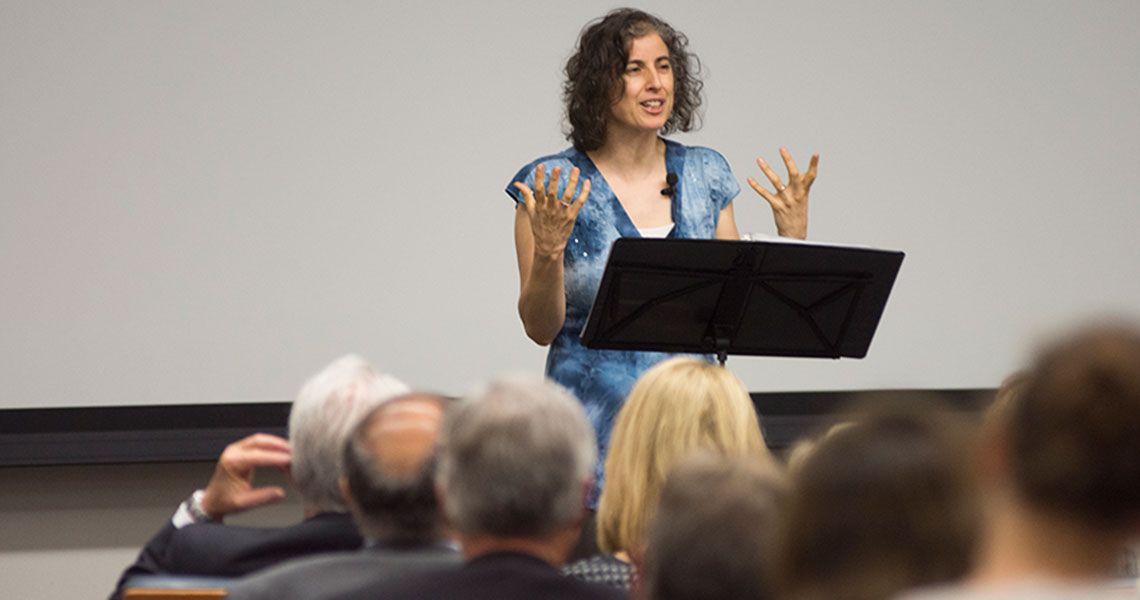Danielle Ofri, M.D., Ph.D., adjusts her microphone while reading from the prologue of her book, “Singular Intimacies: Becoming a Doctor at Bellevue.” She relates the story of Adrienne Berneau, a Frenchwoman insistent upon spelling out her final wishes before an anesthesiologist places her under sedation for a week. “Seven days to figure out whether the spidery latticework that has progressed so rapidly on her chest X-ray is an infection or if it is a suffocating return of her cancer,” Ofri reads. “In seven days we could have a reasonable chance of getting an infection under control. But if the biopsy confirms cancer, the seventh day will be her last.”
Ofri pauses to let the last sentence sink in. Her mellifluous words and sincere appreciation for language stand as a link between physician and patient, she explains, as she closes the book. It is storytelling — physicians acting as characters in their patient’s stories, listening intently as their narratives unfold — that is crucial for humanistic medical care.
Ofri’s philosophy, presented at the 10th Annual Stuart M. Fidler Memorial Lecture at the George Washington University School of Medicine and Health Sciences (SMHS), personifies Fidler, M.D., and his legacy. Robert Wilkinson, M.D., M.A.C.P., Professor Emeritus of Clinical Medicine at SMHS, who stood as the first speaker at the event, was one of Fidler’s first colleagues. “I had the privilege of working with him for more than 30 years,” Wilkinson recalled, adding that Fidler showed an extraordinary commitment to his patients.
Jane, Fidler's wife, explained that for him, medicine was about the patient. In preparation for this year’s lecture, Jane read through the many patient letters she received after her husband’s death; in them, she said, she found evidence of the kindhearted professional her husband was. “He was a smart man,” she told the students, guests, and faculty members assembled in Ross Hall. “But more than that was the relationship he had with his patients.” Her husband, she recalled, once made a home visit to a patient to deliver devastating news that he felt couldn’t be said over the phone. “He later said to me that every word that came out of his mouth was like a knife turning in his heart,” Jane said, “but he delivered the message with as much compassion, caring, empathy, and love as he could. So it was always about the patient. Always and always.”
Alan Wasserman, M.D., M.A.C.P., Eugene Meyer Professor of Medicine and chair of the Department of Medicine at SMHS agreed: “Stu was a loving and caring physician, but he was a superb doctor; you were lucky if he was your internist. Humanistic, caring, devoted, I could go on with these words, but suffice it to say, we want to continue his legacy through this lecture and through this speaker who’s come today.”
As Ofri explained after taking the podium, emotion – like the compassion and care Fidler emulated – “punctuates the speech and drama” of both health care professionals and patients. Facts and books are one thing, she said, but the power of the anecdote, of the experience dealing with a variety of patients, is what adds meaning to the lives of health care professionals.
“These patient stories, more than our textbooks, our review books, our algorithms, our cheat sheets, our iPhones, these are our teachers,” she said. “I think it’s precisely understanding the patient’s story that allows one doctor to click with the patient, and one to endlessly blunder.”
Ofri, like her colleagues, has hundreds, if not thousands of anecdotes, many of which she relates in essays and books and medical journals, where narrative non-fiction has become more popular. She speaks about Adrienne Berneau and about a cranky patient whose difficult personality spread throughout the health care team. “And suddenly, the mouth opened, words began to fly,” Ofri recalled, her voice rising in pitch equal to the drama of the situation. “A torrent of verbiage swarmed like locusts, and in an instant, the intern and I were enveloped in the full rainbow spectrum of defense mechanisms ... the intern and I were now actors in this drama.”
It’s also, Ofri added, the need to tell the story that is a defining part of medicine. As physicians face mounting emotions in the hospital, drawn to certain patients and affected by both negative and positive outcomes, compartmentalizing those emotions can be tricky. Sharing those stories, indulging in the act of telling, is not only cathartic, but also necessary for doctor and patient. “The impulse to tell a story is innate in the human race. We in medicine are drawn to stories because these are what our patients bring to us. We hold our patients’ stories — their words, their voices, their expressions, their fears, their needs, their trust. We hold it in our hands.”
Poetry is also an ideal outlet for the physician, who is, by nature, required to memorize facts and numbers, the details and intricacies of medicine; poetry is a treat, a small number of precise words. “What a delight then — a veritable oasis in the desert — to suddenly allow your focus to drip deliriously into one spot, to wallow in the pleasures of the particular, to allow all extraneous detail to melt away, and be left with a pinpoint of pleasure, a morsel of clarity, a sliver of insight,” Ofri rhapsodized.
As she turned back to the audience, Ofri took a moment to emphasize both her respect for medicine, particularly the evidence-based approach, and physicians’ roles in their patients’ lives. “We are part of these stories, as they are a part of us. No matter how efficient medicine becomes, no matter how computerized, automated, algorithmed, wireless, evidence-based, or ‘QA’ed’ it becomes, medicine will always boil down to one doctor with one patient, in one room, with one story.”



